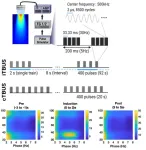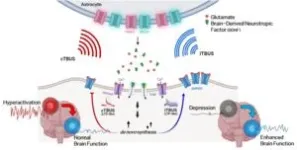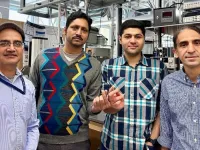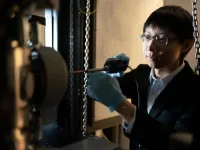Revolutionary brain stimulation technique shows promise for treating brain disorders
Patterned low-intensity low-frequency ultrasound (LILFUS) promises safe and effective to control brain functions
2024-02-23
(Press-News.org)
The human brain's adaptability to internal and external changes, known as neural plasticity, forms the foundation for understanding cognitive functions like memory and learning, as well as various neurological disorders. New research conducted by a team led by Dr. PARK Joo Min of the Center for Cognition and Sociality within the Institute for Basic Science (IBS) unveils a novel technique that could transform the treatment landscape for brain disorders. The team developed a non-invasive brain stimulation method called Patterned Low-Intensity Low-Frequency Ultrasound (LILFUS), which holds tremendous potential for inducing long-lasting changes in brain function.
Traditionally, magnetic and electrical brain stimulation methods have been used to modulate brain function. However, these methods come with inherent limitations that restrict their spatial resolution and penetration depth, making it challenging to precisely stimulate specific brain regions with optimal efficacy. More invasive methods, such as those that require surgical procedures, exhibit superior control and therapeutic effects for specific deep brain stimulation, but they come with risks such as tissue damage, inflammation, and infection. These limitations have fueled the search for alternative approaches that can overcome these constraints and provide more efficient and precise modulation of brain function.
In the latest study unveiled by the IBS, researchers used ultrasound to enable precise stimulation of specific brain areas. Unlike electromagnetic waves, ultrasound has the advantage of being able to penetrate deep into the brain tissues. The researchers discovered that ultrasound stimulation can modulate neural plasticity - the brain's ability to rewire itself - through the activation of key molecular pathways. Specifically, the study pinpointed the ultrasound’s effect on mechanosensitive calcium channels in astrocytes, which controls the cells’ ability to uptake calcium and release neurotransmitters.
LILFUS was designed based on specific ultrasound parameters that mimic the brainwave patterns of theta (5 Hz) and gamma (30 Hz) oscillations observed during learning and memory processes. The new tool allowed the researchers to either activate or deactivate specific brain regions at will - intermittent delivery of the ultrasound was found to induce long-term potentiation effects, while continuous patterns resulted in long-term depression effects.
One of the most promising aspects of this new technology is its ability to facilitate the acquisition of new motor skills. When the researchers delivered ultrasound stimulation to the cerebral motor cortex in mice, they observed significant improvements in motor skill learning and the ability to retrieve food. Interestingly, researchers were even able to change the forelimb preference of the mice. This suggests potential applications in rehabilitation therapies for stroke survivors and individuals with motor impairments.
The implications of this research extend far beyond motor function. It may be used to treat conditions such as depression, where altered brain excitability and plasticity are prominent features. With further exploration, LILFUS could be adapted for various brain stimulation protocols, offering hope for various conditions ranging from sensory impairments to cognitive disorders.
Dr. Park stated, "This study has not only developed a new and safe neural regulation technology with long-lasting effects but has also uncovered the molecular mechanism changes involved in brainwave-patterned ultrasound neural regulation." He further conveyed, "We plan to continue follow-up studies to apply this technology for the treatment of brain disorders related to abnormal brain excitation and inhibition and for the enhancement of cognitive functions."
END
[Attachments] See images for this press release:


ELSE PRESS RELEASES FROM THIS DATE:
2024-02-23
Warmer soils harbour a greater diversity of active microbes, according to a new study from researchers at the Centre for Microbiology and Environmental Systems Science (CeMESS) at the University of Vienna. The study, published in Science Advances, represents a significant shift in our understanding of how microbial activity in the soil influences the global carbon cycle and possible feedback mechanisms on the climate. Until now, scientists have assumed that higher soil temperatures accelerate the growth of microbes, thus increasing the release of carbon into the atmosphere. However, this increased ...
2024-02-23
A new study from Stanford University, published Jan. 19 in Patient Education and Counseling, evaluates the effectiveness of patient mindset training on provider learning and behavior.
Past research shows that what patients think, believe, or expect regarding medical care can influence care outcomes. Patients also have better outcomes when they have more adaptive mindsets about their treatments (e.g., “this treatment will be effective”), their bodies (e.g., “my body is capable”), their illnesses (e.g. “diabetes is manageable”), and their care team (e.g., “I am in good hands”). ...
2024-02-23
UNIVERSITY PARK, Pa. — Implantable biomedical devices — like pacemakers, insulin pumps and neurostimulators — are becoming smaller and utilizing wireless technology, but hurdles remain for powering the next-generation implants. A new wireless charging device developed by Penn State scientists could dramatically improve powering capability for implants while still being safe for our bodies, the researchers said.
The new device can harvest energy from magnetic field and ultrasound sources simultaneously, converting this energy to electricity to power implants, the scientists reported in the journal Energy & Environmental ...
2024-02-23
BUFFALO, N.Y. – Recombinant protein vaccines, like the Novavax vaccine used to fight COVID-19, offer several advantages over conventional vaccines.
They’re easy to precisely produce. They’re safe, and potentially more effective. And they could require smaller doses.
Because of these traits, there is much interest in developing recombinant influenza vaccines. To date, however, the Food and Drug Administration has approved only one such vaccine.
A University at Bufalo-led research team hopes to add to that number. It is developing a new recombinant flu vaccine – described ...
2024-02-23
UNIVERSITY PARK, Pa. — A new class of metallic materials with potential applications in airplane turbines, nuclear reactors and equipment for space exploration can withstand extreme temperatures and resist fractures, but scientists haven’t understood why until now. According to a new study co-led by Penn State researchers, the answer could relate to the material’s short-range order, or the local arrangement of atoms within a material. This knowledge could lead to further improvement in the mechanical performance and damage tolerance of these materials, the researchers said, leading in turn to advancements in the safety and reliability of next-generation ...
2024-02-23
Parkinson's disease, the second most common type of progressive dementia after Alzheimer's disease, affects nearly 1 million people in the U.S. and an estimated 10 million individuals worldwide. Each year, close to 90,000 new cases of Parkinson’s disease are diagnosed in the U.S.
In a new study, Jeffrey Kordower, director of the ASU-Banner Neurodegenerative Disease Research Center, and his colleagues unveil pivotal insights into the progression of Parkinson's disease, presenting new hope for patients battling the severely debilitating disorder.
The research highlights the role of a critical protein called tau in the early stages of the ...
2024-02-23
UNIVERSITY PARK, Pa. — Supplementing the feed of high-producing dairy cows with the botanical extract capsicum oleoresin, obtained from chili peppers, or a combination of that extract and clove oil resulted in the animals using feed energy more efficiently and emitting less methane from their largest stomach, according to a new study conducted by Penn State researchers.
Adding those substances, sometimes referred to as essential oils, to the cattle’s rations resulted in improved efficiency of energy utilization in peak-lactation dairy cows. According to Alex Hristov, distinguished professor of dairy nutrition, ...
2024-02-23
• Researchers to explore the use of gel electrolyte materials to improve lithium-ion batteries
• The batteries are the most commonly used in electric vehicles and electronics
• Will use non-harmful, non-flammable and renewably sourced materials for next generation battery technologies.
Aston University researchers are to explore the use of gel electrolyte materials to make lithium-ion batteries - the most commonly used for electric vehicles and electronics - safer and less environmentally damaging.
The University has received a grant of £443,058 from the Engineering and Physical Sciences Research ...
2024-02-23
When people hear about predicting heart disease, most will think of cholesterol levels. While cholesterol is a major contributor to heart disease, a recent study from Brigham and Women's Hospital, a founding member of Mass General Brigham, found that a glycan biomarker of IgG is also an important predictor for cardiovascular diseases (CVD). The researchers studied the sugar coatings on an antibody known as immunoglobulin G (IgG), which is implicated in the immune responses associated with chronic inflammation among participants in two case-control studies. The results of this investigation provide another biomarker for identifying risk of CVD, which could lead to earlier diagnosis ...
2024-02-23
Sir Peter was knighted for his contribution to IT and businesses in the Midlands in 2002
He will provide guidance, support, advocacy and strong links to industry in his role
The Institute will drive digital innovation and ensure digital inclusion.
Aston University is delighted to announce that it has appointed one of the UK’s most respected and successful business leaders, Sir Peter Rigby, as honorary chair of its new Digital Futures Institute.
The announcement of Sir Peter’s appointment was made in front of guests at the inaugural lecture given by Professor Abdul Sadka, director of the Digital ...
LAST 30 PRESS RELEASES:
[Press-News.org] Revolutionary brain stimulation technique shows promise for treating brain disorders
Patterned low-intensity low-frequency ultrasound (LILFUS) promises safe and effective to control brain functions








